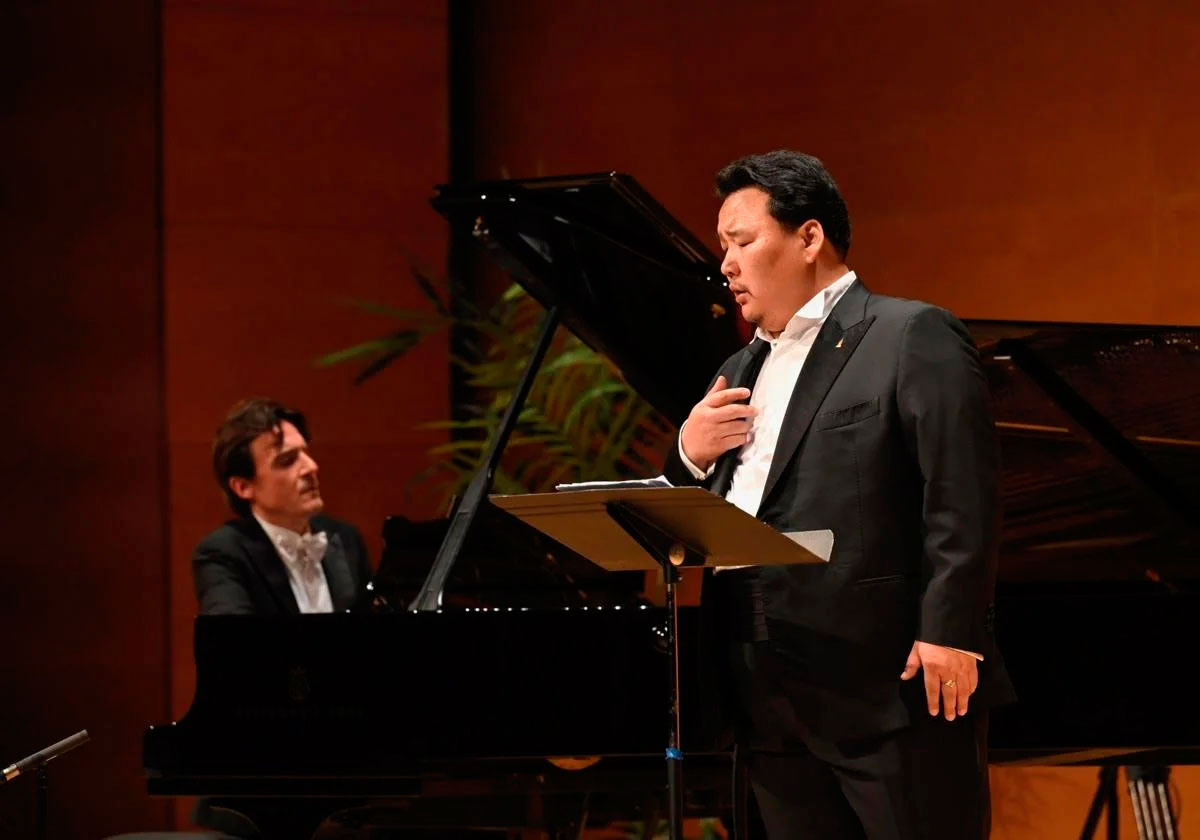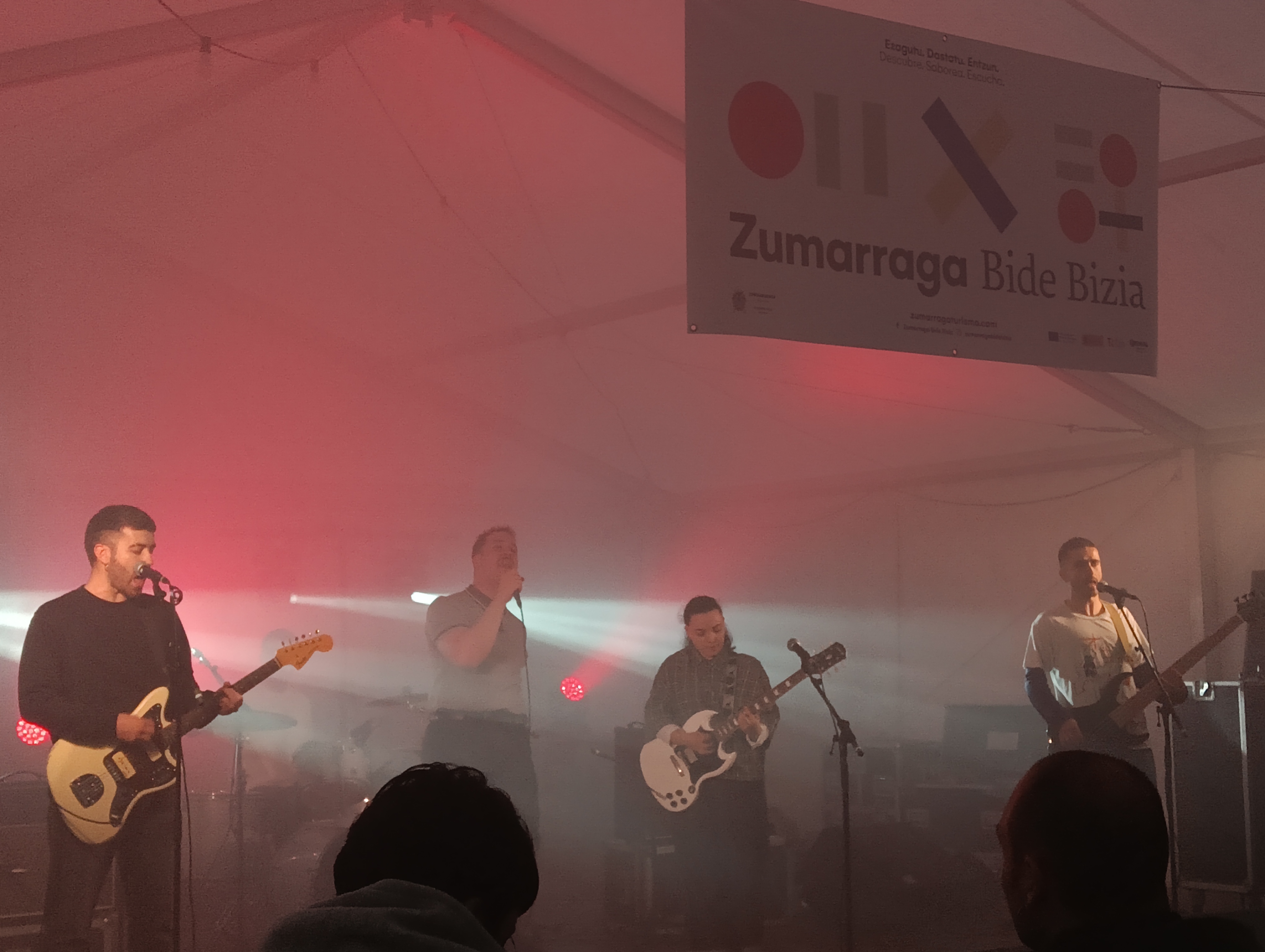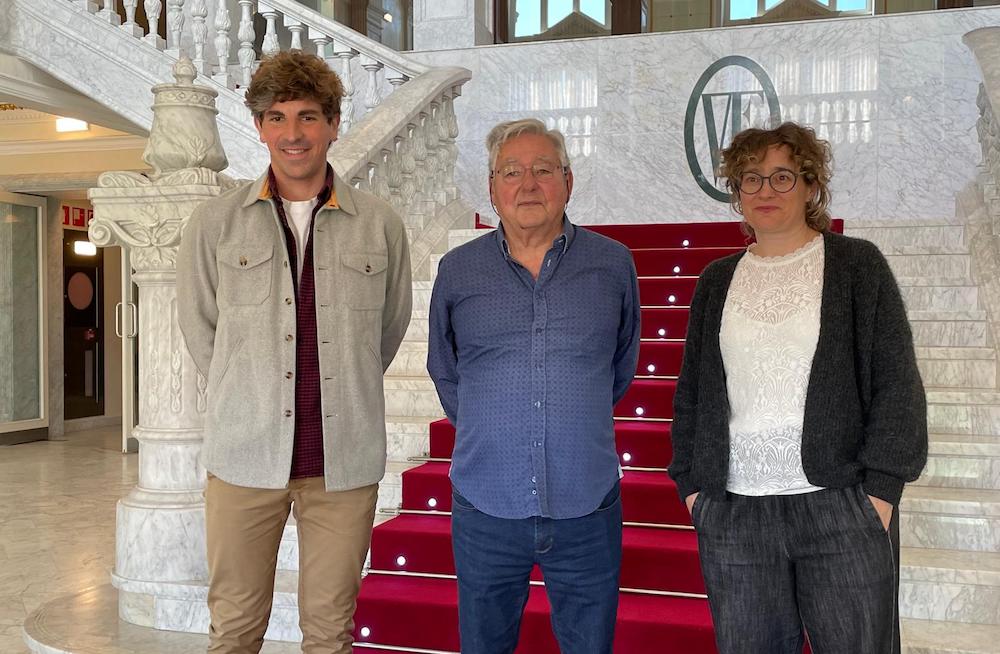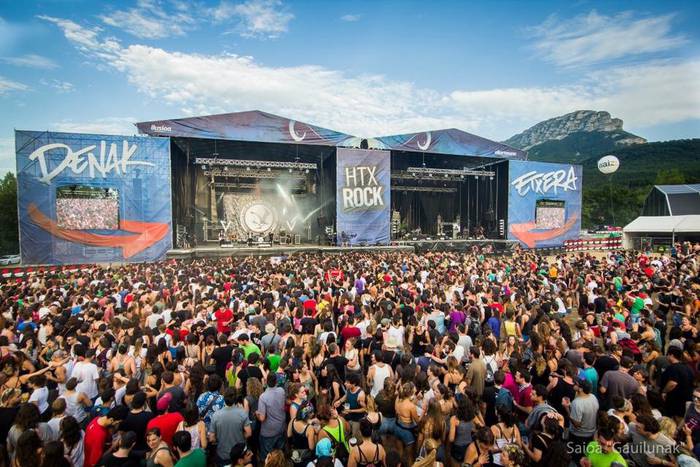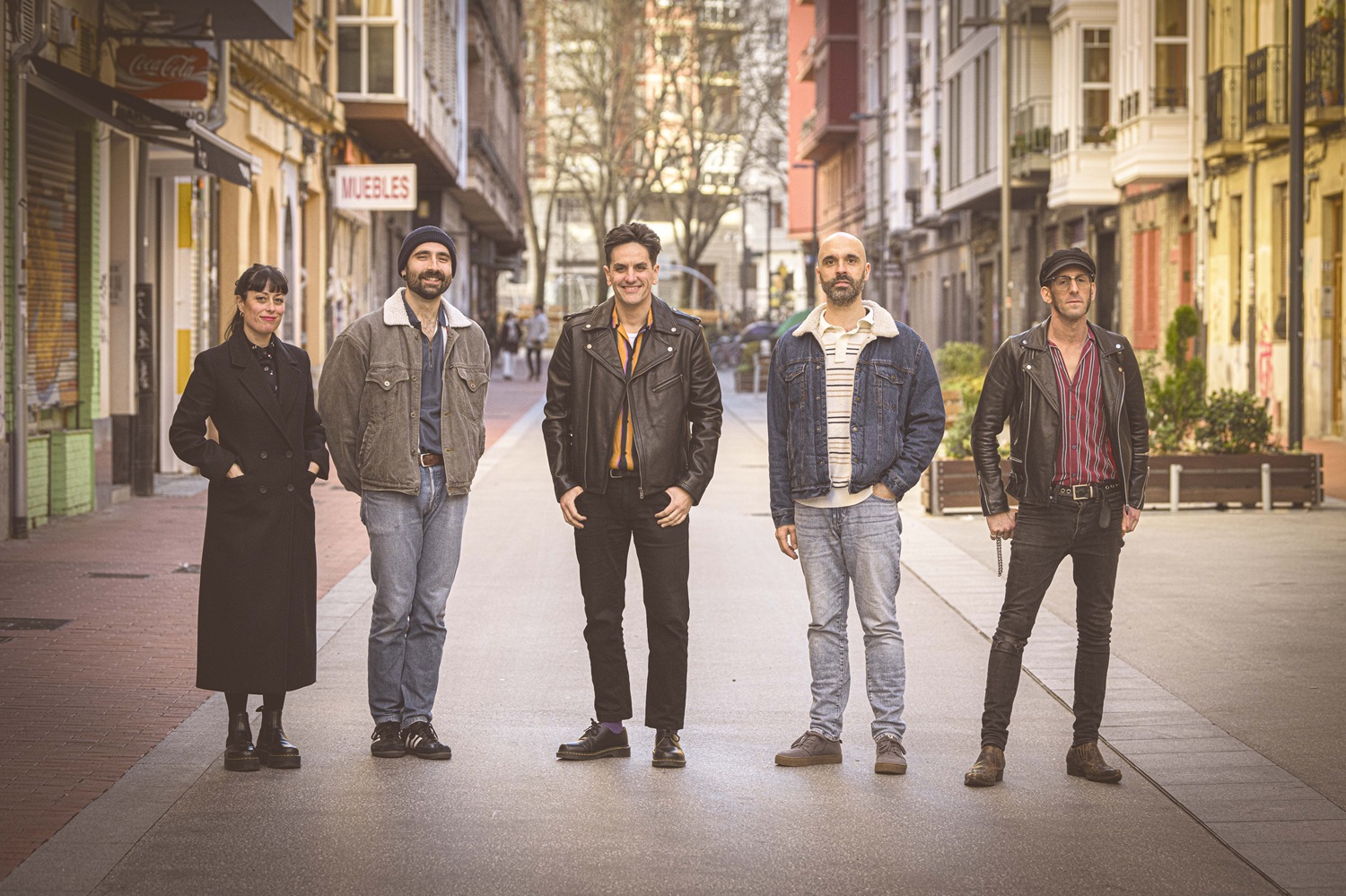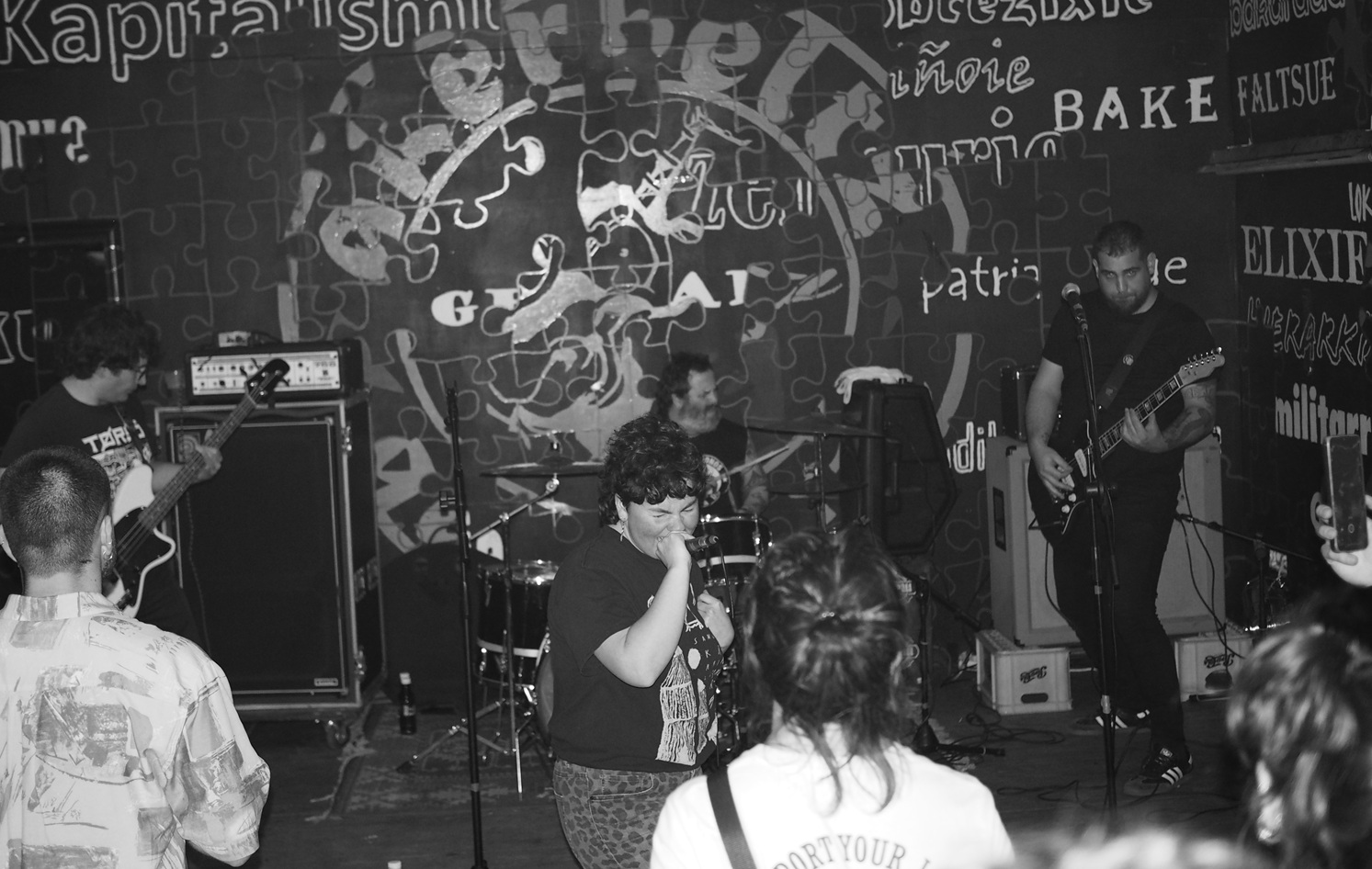"With the Internet, industry is not needed for music"
- What if the world was at the ends of the guitarist's fingers?

The guitar?
I am the one who saw no more than the guitar at the time that was chosen between the accordion and the piano. So, we listened to the music in the parents' car. In Euskal Herria, Pedrito Fernández, Laboa, and the Basque folk, Beatles ez, were heard. Later, Euskal Rock Radikala told me she wanted the guitar to rock. The Cock and Kortatu were my first two bands, then I became obsessed with Barricada, and at 16 years old came the first electric guitar. I played the songs of those groups, it was my favorite style. Until I was 20 years old, time spread it between sport and guitar, but from there I've had the guitar in my head for almost 24 hours, until I became an obsession. I've often been told by my colleague that I'm from the guitar. What you want, we've come together the path of a hobby of commerce, and at 40 years old, taking the guitar off would be a little bit of a fuck for me.
Sleeveless guitar without Bera's musical microclimate, dry trout?
We are bordering and, in any case, borders are living spaces in continuous and widespread movement. So, the musicians that we've left Bera don't make standard music, we're on more different paths. We touch what is in line with our culture, with our musical culture. We are the consequences of a huge exchange of records. We went down to the bar and we were some melodies that shared discs between beer and we listened. We were in the middle of our quest, what we were given in radio and television formulas didn't value us, we didn't like it, and we couldn't stop satisfying our hunger for music. This is how we enter the paths and how one path leads to another, this is how we walk.
The exchange of records in the bar seems like a prehistoric scene.
What was previously done by hand in the hostel is now done via Facebook and Youtube. It is true that the intimate link has disintegrated, that the exchange is much more global and broader, but thanks to Facebook the discovery of the album of a marginal group of a lost city in the United States has no price. The problem is that, in general, music is heard in more precarious conditions, not only because of the poor quality of the Mp3 format and the computer speaker, but also because of the transformation of the listening process of music. When you put yourself in your living room to hear the album you were at it, you felt the melodies, you breathed every note. Now you're on the Internet, listening to music at the same time, watching a video and sending a message to your friend. As if it were not enough, they are the dates of the Single and the video clip. Imagine someone says you don't need a disc with a video clip that's going around on Youtube. It may be known and serve to spread your work to the four winds, but I like the people who make records, who propose an entire piece, a general sound. But we live in the culture of immediacy, and music is not safe from that. If you want to be famous, go ahead, but how will you be if you don't have repertoire and ability to play live? I without the guitar, hug, and the one who has only one song, patizambo.
Should we hand in hand the possibility of lowering music for free or better abandon the debate?
It's not easy. Times have changed and, if you join the era, it seems you have to give your music almost free and you have to pay for your work in other ways. The idea of free art is very romantic, but why does art have to be free and paying the electrician? We also need our compensation. So I think it is important to maintain the free and free character of the Internet, but compensation should be charged live. What do the entrances become expensive? I am not against it. What are the 100 euro tickets to see Tom Waits in Kursaal? It's money, but any quarrier takes away 500 veneers for doing and everything in silence. It is the job of any worker, whether he or she is a songwriter or musician, that pays. Obviously, compared to fixing the car, going to a concert is not an imperative need, but I don't know if culturally we are getting poorer, I don't know if we appreciate the culture to its fair extent.
Do we appreciate a poorer culture?
The culture we sell and sell to us is very soft, very easy to eat, poor. Maybe human beings don't carve, we're more animals than we think, and if we have society, it's because we don't get to what we think we are. If there are no journalists who do not do serious research work or if the journalist is forced to work at full speed, it is difficult for a thorough reflection to be published, and once people get used to the easy, there is no turning. I've been told that my music wasn't too easy, that it would go too far on the radio, and I think it's a flower, more than a criticism. I don't believe in music or anything, I don't believe in molds. You have to do what you think you should do, go look for what is good for you. To enter the mold is to impoverish your creation with the need to facilitate it. Do you like another way? It's ripping, because that's how the results come in all walks of life. I recognize that I've done a job or another trend, but don't think I've got a better result... Ja, ja,
ja.Las music schools and academies are also known as molders. He has been a professor for many years.
I've worked in private academies and public schools. Although it gradually spreads, the methodology used in the public is focused on classical music, and although it is necessary the classic, today in a music school there is no grounded pop-rock teaching is as implausible as reactionary. In the academies there is more plurality, but in general it is taught in the face of the immediate result, from the mold to the mold, doing the best possible and doing the best possible. In no teaching system is an artist educated on the basis of his personality. It is essential to work on a sound basis, but the most important and difficult lesson to achieve is to find and tear down one’s own path. So I don't like to teach, I like to play, share with other musicians, create.
So three years ago, did you decide to abandon teaching and live music?
I was very burned by teaching and my body was asking for a change. In addition, I had a guarantee of money that I hadn't had before, because until then I didn't know if I could live as a musician, but I realized that I had three strong projects in my hands, and I bet. Then I had a kind of contradiction, because I was starting to teach precisely because I didn't put myself in the molds. I didn't want to make music just for the money. Even though I didn't give concerts or sell, I wanted to make the music I wanted, and have the source of income secured by another way. But three years ago, I realized that the projects I had were attractive, I felt like a musician, not a professor, and I jumped. Now I'm doing what I like. That the lack of concerts in a few months and the need to raise money somehow creates a point of stress? Yes, but it also gives you life, because you do not stop looking for new formulas. Imagine, the orchestral man project that has given me the most, emerged in a time space where I didn't have a concert! This lifestyle fuels the adrenaline generated by any crisis situation. I don't have a job? Well, to give the doors, to propose new formulas, perhaps because it does not give the level to spend more hours in the tests... There is no more. That gives me a lot, both artistic and personal.
If we look at the industry cries, we will say that they are not the best times for a wager like the tuya.La
industry is the one that is in crisis, not music. Music has never been in crisis, and I think it's never going to be. It is industry that does not know what to do, that cannot find a space. Both the multinational and the Basque Country have lost their stamps. So it would be better if it were to disappear. I believe in the artist who manages his music, and with the Internet, the industry is not necessary for music. Bleeding is at work. The result is effort, questioning what you're doing, tearing your way. Here were people who felt very comfortable, believing that it was a formula and companions forever, forgetting that changing and adapting continuously means work. That's what put the Internet on its head, not music.
It's a list of your jobs that can fall upside down. Big projects, small, alone, helping others...
The biggest difference is that you're on the front line or helping others. When you're just all eyes on you, the test is more rigorous and the biggest concern for success or failure is yours. On your own, each round of applause makes you feel more alive and more deeply hurt. That's why I say the second line is more comfortable, but at the same time, the satisfaction of a glorious solo concert makes you raise your self-esteem. Therefore, I do not attach importance to the dimension of the concert. If I'm comfortable playing, I don't care to be in a bar or in a great theater. What does playing with Duncan Dhu cause nerves at first? Of course, but I have always found concerts more difficult in the presence of ten people than in those of 500. They're very special feedback concerts, no traps. It is true, on the other hand, that when I am going to play I just have to assemble and disassemble all of me, and for example with Duncan Dhu I have no more to be quiet in the cameramen, but I do not give any importance to that. What I like is playing live.
Do the direct ones have a future?
We have a big problem: the lack of a public. In Euskal Herria, at least, there has been no generational change among people going to concerts. Concerts of some musical styles are attended only by people over 30 years of age. In addition, I notice a lack of interest in live music. The BBK Live and others are crowded, but the concerts in the bars are nothing but a disaster. As if it were not enough, “today also the musicians!” some of them complain about not being able to drink a beer with a concert. There's another contradiction: people won't listen to music at the music festivals that most people congregate, and in most cases music isn't the most important. The sound of the festivals is usually bad, you can't see your group up close, play without its own scenography and assembly, it has a limited time... I've experienced this fad of festivals badly. I'm convinced that people going there don't really appreciate the music. How else can we explain that at the San Sebastian Jazz Festival you can't fit in the street and that at the Altxerri concerts throughout the year they have so much space left? Fashion is very damaging.
Fashions fashion, can you imagine a world without music?
To assume that the lack of public can condemn the direct does not mean that music has no future. There will always be music, there will always be work for musicians. If children and young people like video games, they will have to make music for video games, if they then make movies, they will have to make music for movies... Only formulae will be changed. In any case, I believe that the direct ones will be maintained in one way or another. At least in my life. I imagine very well the people of my generation going to rock concerts at 60-70 years old. That is why, for the time being, I see myself playing directly. In a few years' time, coming younger and better people, and what groups I help need something else? Well, I'll recite it and continue with my trajectory. Why not, at the age of 60, a project exclusively on guitar? I'm working to get somewhere, though I still don't know exactly how to define it.
Joseba Irazoki 1974an sortu zen Beran. Maixa eta Ixiar, Xabier Montoia, Petti, Anje Duhalde, edo Mikel Erentxunekin astindu ditu gitarraren sokak, bere inguruan sorturiko Onddo, Do edo On Benitorekin zein bakarka aritzeaz gain. Egun, Atom Rhumba-ko partaidea da, bakarka kontzertuak eman eta eman ari da, Duncan Dhu-rekin biran dabil, eta ez dauka geldi egoteko asmorik.
“Artista guztiek dugu exhibizionista puntu bat. Denoi gustatzen zaigu norbait gure lanaz galdezka etortzea, hedabideetan gure lana aipatzea, baina promozio sasoia heltzean... Nire desio handiena disko bat egin eta elkarrizketa bakar bat eman gabe jendeak entzutea litzateke. Nahiago nuke musikak soilik hitz egingo balu. Baina ez da posible, promozioa egin beharra daukagu. Orokorrean bizia ematen dio proiektuari”.
BRN + Auzoko eta Sain mendi + Odei + Monsieur le crepe eta Muxker
Zer: Uzta jaia.
Noiz: maiatzaren 2an.
Non: Bilborock aretoan.
---------------------------------------------------------
Ereindako haziek ura, argia eta denbora behar dute ernaltzeko. Naturak berezko ditu... [+]
Amartuvshin Enkhbat baritonoa
Pianoan: Stefano Salvatori.
Antolatzailea: OLBE.
Zer: Verdi, Mascagni, Leoncavallo eta Giordanoren operen ariak.
Non: Bilboko Euskalduna Jauregian.
Noiz: martxoaren 29an.
Aramu + AimarZ
When: April 26.
In which: The Zumarraga Open Field.
---------------------------------------------------------
The website of the City Council says: "The tourist brand Viva Viva and the festival of the same name are designed to show the world the soul of... [+]
Transparent Beings
When: April 20th.
In which: In the Plaza of the Castle of Pamplona.
-----------------------------------------------
The concert is only half an hour away in the Plaza del Castillo de Pamplona; but it is still half empty, because it is raining. Whether... [+]
Obduction of Amenaza / Zirt Zart (Split-ep)
2024
---------------------------------------------------
The musical panorama is gigantic, impassable. Among them there are a few large groups that absorb all the foci; many others that are dedicated to the pursuit of it, and... [+]
Aposapo + Mäte + Daño Dolor
When: April 5th.
In which: In the Youth Center of Markina-Xemein.
---------------------------------------------------------
I’ve made my way to the cheese house with the shopping cart full of vegetables, and we’ve spent the evening cutting... [+]
Poliorkêtês
Kerobia
Autoekoiztua, 2025
--------------------------------------------------------
Azken aldian, lerrootan asko nabil hausnartzen musikak izan beharko lukeen “misio historikoaz” eta abarrez. Eta, nolabait, zer egin beharko lukeen... [+]
On March 7, the 150th anniversary of the birth of Maurice Ravel, the best Basque composer of all time. And in LA LUZ a tribute was paid to this composer, recalling the influence of the famous Bolero on the collective imagination.
By chance, Deutsche Grammophon has just released... [+]









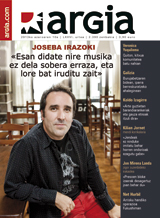


.jpg)

